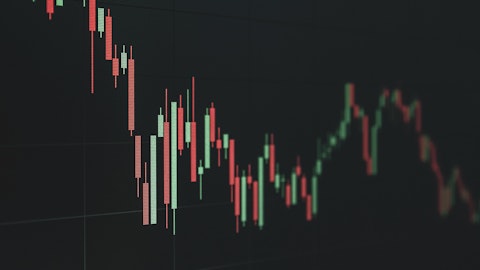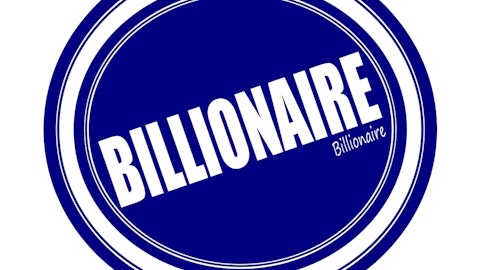In this article, we will take a look at the 10 Defensive Stocks Billionaire Ken Fisher is Betting On.
Ken Fisher, an American billionaire investor, author, and financial analyst, founded and runs Fisher Asset Management. He is a world-renowned investment manager recognized for his contrarian approach and strong belief in capitalism. With an estimated net worth of more than $11.2 billion, he ranks among the world’s wealthiest billionaires. The son of famed investor Philip Fisher, also known as the “Father of Growth Investing”, he coupled his father’s growth philosophy with a data-driven value mindset. Long before he became a popular name in the financial industry, Fisher made waves in the 1980s with a revolutionary idea: utilizing the Price/Sales ratio as a major tool for spotting bargain firms. Fisher noted that earnings are frequently erratic, particularly over short periods. Companies may report lower earnings on account of temporary issues such as R&D spending or accounting adjustments. Sales, on the other hand, are more steady and offer a better understanding of a company’s business strength.
Anyone that follows Fisher knows that he is one of the market’s most outspoken pundits. He thinks that, while political developments might elicit strong emotions, they rarely affect the market’s long-term direction. According to Fisher, bull markets often end as a result of either unrestrained investor enthusiasm or an unforeseen economic shock with global implications.
Interestingly, his views on several subjects, notably tariffs, appear to have evolved. Fisher has previously downplayed the potential impact of President Trump’s tariffs, stating that they may not be fully enforced or be in place for as long as anticipated. He also stressed that businesses are highly adaptable to changing economic policies, which he felt may help reduce long-term harm. However, in a recent post on X, the billionaire criticized the government’s plan to impose wide tariff measures:
“What Trump unveiled Wednesday is stupid, wrong, arrogantly extreme, ignorant trade-wise and addressing a non-problem with misguided tools. Yet, as near as I can tell it will fade and fail and the fear is bigger than the problem, which from here is bullish.”
Europe to Lead the Market
Over the last two years, the United States has dominated global markets, propelled by large growth stocks in the technology and technology-related communication services sectors, which accounted for more than 40% of US market capitalization, significantly exceeding the rest of the world’s 11%. These firms have greatly increased US returns, but Europe, where such equities account for less than 10% of total market capitalization, missed this edge. Europe’s rising stock presence is primarily restricted to luxury products, which struggled in 2024 as Asian buyers cut spending. As a result, Europe underperformed significantly during the two-year period, returning only 24.1% compared to the US’s 60.3%. Now, however, Europe is taking the lead, and its leading sectors—primarily value stocks linked to economic cycles rather than long-term trends—are primed to benefit, a sentiment that Ken Fisher echoes himself:
“This should be the first year in quite some years where value beats growth. And as that happens, the US lags the non-US world, and particularly Europe, which is so heavily value laden. So that’s been my core forecast. That will remain my core forecast until I see some big change or something different that should make me change my mind. But I babble on these videos pretty much every month, so you can hear that if it ever happens this year. Otherwise, that’s my view. I think it’ll be another big year in the market with global 20% kind of returns.”
“I don’t really know for the S&P 500, but stronger overseas, which is the part that you don’t really get to feel as an American. This year, the S&P doesn’t feel strong. It’s up, as I speak, but it doesn’t feel strong, and particularly not as NASDAQ and Tech stocks are lagging the S&P. But look overseas and see how much stronger it is there because that’s where the market is.”

Ken Fisher of Fisher Asset Management
Our Methodology
For this article, we picked defensive companies from Fisher Asset Management’s 13F portfolio as of the end of the fourth quarter of 2024. The following firms have low beta values (<1), consistent dividend histories, and robust businesses. Additionally, we have mentioned the hedge fund sentiment around each stock, as of Q4 2024.
Why are we interested in the stocks that hedge funds pile into? The reason is simple: our research has shown that we can outperform the market by imitating the top stock picks of the best hedge funds. Our quarterly newsletter’s strategy selects 14 small-cap and large-cap stocks every quarter and has returned 373.4% since May 2014, beating its benchmark by 218 percentage points (see more details here).
10. Colgate-Palmolive Company (NYSE:CL)
Beta Value: 0.37
Dividend Yield: 2.27%
Fisher Asset Management’s Q4 Stake: $6.6 million
Number of Hedge Fund Holders: 62
Colgate-Palmolive Company (NYSE:CL) is a multinational company that manufactures, distributes, and offers a wide range of household, healthcare, personal care, and veterinary products.
On February 3, TD Cowen reiterated its Buy rating and $100 price target on Colgate-Palmolive Company (NYSE:CL). The firm’s adjustment follows the company’s fourth-quarter gross margin increase, which was 70 basis points (bps) lower than the 290 bps expansion witnessed in the prior three quarters. To begin countering this FX impact, Colgate-Palmolive implemented price changes in Latin America and Africa during the first quarter. The company expects gross margin increase in fiscal year 2025 to be driven by revenue growth management and efficiency improvements.
Over the past year, the company generated $20.1 billion in revenue and reported earnings per share of $0.91. However, organic sales growth of 4.3% fell short of the expected ~6%, indicating a downturn in the first half 2025. In contrast, the company’s Hill’s pet nutrition brand had a 25% increase in the fourth quarter of 2024.
Diamond Hill Large Cap Strategy stated the following regarding Colgate-Palmolive Company (NYSE:CL) in its Q4 2024 investor letter:
“As valuations have continued rising and the economic cycle has gotten relatively long in the tooth, we’ve thought carefully about where and how we are exposed to more cyclical stocks. As such, we initiated just two new positions in Q4: Colgate-Palmolive Company (NYSE:CL) and the aforementioned lululemon.
Colgate-Palmolive is a high-quality business with leading positions in oral care, home products and pet nutrition. Historically, the company has allocated capital well, and it produces significant free cash flows. Shares were pressured in Q4 primarily, we believe, in sympathy with near-term macroeconomic concerns rather than any fundamental issues at the business. We consequently capitalized on the underperformance and compelling valuation to start a position.”
9. The Coca-Cola Company (NYSE:KO)
Beta Value: 0.46
Dividend Yield: 2.92%
Fisher Asset Management’s Q4 Stake: $412.13 million
Number of Hedge Fund Holders: 81
The Coca-Cola Company (NYSE:KO) is a multinational beverage company that produces, develops, and sells a broad variety of nonalcoholic beverages. Coca-Cola’s brands include Fanta, Fresca, Schweppes, Sprite, and others.
In Q4 2024, the company’s revenues reached $11.5 billion, up 6.5% over the previous year. Organic revenue grew by 14%, owing to a 9% rise in price/mix and a 5% increase in concentrate sales. Moreover, The Coca-Cola Company (NYSE:KO) achieved solid cash flow, with $2.9 billion in operations and $1.6 billion in free cash flow. The company also recorded a strong adjusted operating margin of 30.7%.
Piper Sandler recently boosted KO’s price target to $80, citing projections of 5-6% organic sales growth in 2025 and keeping an Overweight rating on the company. Similarly, Erste Group raised The Coca-Cola Company’s stock rating from Hold to Buy, noting solid profitability and ambitious growth prospects.
8. Unilever PLC (NYSE:UL)
Beta Value: 0.42
Dividend Yield: 3.10%
Fisher Asset Management’s Q4 Stake: $1.01 billion
Number of Hedge Fund Holders: 31
Unilever PLC (NYSE:UL) is a British multinational fast-moving consumer goods corporation formed through the combination of British soap manufacturer Lever Brothers and Dutch margarine producer Margarine Unie. The company owns a diversified portfolio of popular brands, which include the likes of Ben & Jerry’s, Dove, Hellmann’s, Knorr, Lux, Magnum, Sunsilk, and Wall’s.
On March 28, Citi analysts reiterated their Buy rating on Unilever (NYSE:UL) and set a price target of GBP52 on the company’s shares. The analysts also reduced their expectations for Unilever’s first-quarter organic sales growth (OSG) by 0.40 percentage point to 2.5%. This adjustment reflects ongoing consumer weakness in Western economies and a depressed price environment in Southeast Asia. Despite these changes, Citi’s long-term outlook for Unilever remains bright. Citi anticipates a significant recovery in Unilever’s margins in the second half of the year, driven by price hikes that surpass the cost of goods sold (COGS) inflation and mid-single-digit OSG.
In fiscal Q4 2024, the company’s earnings per share marginally beat analyst forecasts of £2.965, achieving £2.98, owing to strong operational efficiency. However, revenue for the quarter fell short of expectations, totaling £14.2 billion. The revenue shortfall was mostly attributable to foreign exchange headwinds and market problems. Despite this, Unilever PLC (NYSE:UL) reported considerable growth in its key brands.
7. Johnson & Johnson (NYSE:JNJ)
Beta Value: 0.41
Dividend Yield: 3.24%
Fisher Asset Management’s Q4 Stake: $1.18 billion
Number of Hedge Fund Holders: 98
Johnson & Johnson (NYSE:JNJ) is a notable name in the healthcare industry, which includes sub-sectors like pharmaceuticals, medical equipment, and consumer health products. The company is known for creating medications to treat a variety of conditions and diseases, including cancer, diabetes, and HIV/AIDS.
On April 4, UBS reaffirmed its Buy rating and $180 price target for Johnson & Johnson (NYSE:JNJ). Despite a blow from an unexpected judicial ruling involving talc-related cases, UBS believes Johnson & Johnson’s core business will stay robust. UBS noticed trends in new prescription (NBRx) and total prescription (TRx) growth, pointing out a 14% quarter-over-quarter rise in TRx for Tremfya, a drug used to treat plaque psoriasis and psoriatic arthritis.
The company has grown its dividends for 62 consecutive years and now pays a quarterly dividend of $1.24 per share. As of April 5, the stock’s dividend yield was 3.24%.
6. PepsiCo, Inc. (NASDAQ:PEP)
Beta Value: 0.46
Dividend Yield: 3.70%
Fisher Asset Management’s Q4 Stake: $1.23 billion
Number of Hedge Fund Holders: 69
One of the most well-known names in the world, PepsiCo, Inc. (NASDAQ:PEP) is an American multinational company involved in the food, snack, and beverage sectors. Known for its robust financial foundation, the company has grown dividends for 51 years in a row. It currently pays a quarterly dividend of $1.36 per share, representing a yield of 3.32%.
On March 20, Jefferies analyst Kaumil Gajrawala lowered the price target on PepsiCo, Inc. (NASDAQ:PEP) shares to $165 from $170, while maintaining its Hold rating on the stock. Gajrawala’s evaluation highlighted recent issues experienced by the company’s Frito-Lay segment, which had a 5% reduction over a few weeks ending March 8. Despite maintaining attractive gross profit margins of 54.89%, the analyst expressed worry that Pepsico’s cost savings may not be realized for at least a few months. Gajrawala also added that PepsiCo, Inc. (NASDAQ:PEP) is expected to present a new productivity strategy later this year. The expected expenses for this proposal have been raised significantly, from $3.7 billion to $6.2 billion by 2030.
5. Merck & Co., Inc. (NYSE:MRK)
Beta Value: 0.45
Dividend Yield: 3.98%
Fisher Asset Management’s Q4 Stake: $1.6 billion
Number of Hedge Fund Holders: 91
Merck & Co., Inc. (NYSE:MRK) is an American multinational pharmaceutical company with a history that dates back to the formation of the Merck Group in Germany back in 1668. The company is known for providing prescription drugs, vaccines, biologic medicines, and animal health products.
Merck & Co., Inc. (NYSE:MRK) posted strong financial results for Q4 2024, with revenue up 7% year on year to $15.6 billion. Merck’s strong market position has allowed the business to generate substantial cash flow, reinforcing its emphasis on shareholder returns. Notably, Keytruda sales increased by 18% over the previous year, reaching $29.5 billion.
In a February 24 report, DBS analyst Nico Chen confirmed a Buy rating for Merck & Co. Inc. (NYSE:MRK). He maintained his $100 price target and attributed his upbeat view to Keytruda’s rapid growth. According to the analyst, this blockbuster cancer medicine has increased revenue dramatically and is continuing to grow internationally. Additionally, the analyst believes that Merck’s financial outlook remains positive, with predicted net income growth and reduced patent expiration risks than rivals.
4. UnitedHealth Group Incorporated (NYSE:UNH)
Beta Value: 0.52
Dividend Yield: 1.60%
Fisher Asset Management’s Q4 Stake: $1.73 billion
Number of Hedge Fund Holders: 150
UnitedHealth Group Incorporated (NYSE:UNH) is a renowned US multinational firm that offers managed healthcare and insurance services. The firm is divided into four key segments: UnitedHealthcare, Optum Health, Optum Insight, and Optum Rx.
On April 4, Cantor Fitzgerald reaffirmed its Overweight rating on UnitedHealth Group Incorporated (NYSE:UNH) , with a price target of $700. Sarah James, the firm’s analyst, expressed confidence in UnitedHealth’s performance, predicting that it will outperform its 2025 estimate. James expects that the company’s financial projection will be revised upward, most likely in the second or third quarter of 2025, rather than the first quarter.
UnitedHealth Group Incorporated (NYSE:UNH) posted solid results for fiscal year 2024, which exceeded market forecasts. Revenue climbed by 8% to $400 billion, owing to a broad expansion of its service offerings. During 2024, the company returned more than $16 billion to shareholders through dividends and stock buybacks.
Vulcan Value Partners stated the following regarding UnitedHealth Group Incorporated (NYSE:UNH) in its Q4 2024 investor letter:
“UnitedHealth Group Incorporated (NYSE:UNH), a company that we have owned several times in the past, is the largest health insurer in the United States. UnitedHealth Group also owns Optum, which is a rapidly growing healthcare services company. The environment for the health insurance business remains positive as growth in healthcare spending, driven by chronic diseases and an aging population, will continue to outpace overall economic growth. The insurance business benefits from powerful network effects as more members attract more providers and vice versa, which reinforces United’s value proposition and bargaining power with each side of the network. We respect UnitedHealth Group’s management team and have been very pleased with their long-term vision and execution.”
3. Costco Wholesale Corporation (NASDAQ:COST)
Beta Value: 0.98
Dividend Yield: 0.51%
Fisher Asset Management’s Q4 Stake: $2.82 billion
Number of Hedge Fund Holders: 96
Costco Wholesale Corporation (NASDAQ:COST) is a membership-based warehouse club that provides bulk pricing on a variety of items such as food, electronics, and home supplies. Its members drives the company’s growth, with membership fees accounting for a sizable amount of its revenue. Costco Wholesale Corporation (NASDAQ:COST) announced that non-foods sales increased in the low teens in February, with jewelry, gift cards, and housewares outperforming other categories.
On March 24, Citi analyst Paul Lejeuz revised the price target for Costco Wholesale Corporation (NASDAQ:COST) to $927, down from the previous $1,060, while maintaining a Neutral rating on the stock. Lejeuz highlighted that Costco is well-positioned in the short term, if consumer demand weakens or the tariff situation worsens, and that Costco already operates a winning retail model, as evidenced by its impressive 22 consecutive years of dividend payments.
Costco Wholesale Corporation (NASDAQ:COST) posted solid second-quarter fiscal 2025 earnings, with net income of $1.788 billion, or $4.02 per diluted share. This is an 8.4% increase when certain tax-related items are excluded.
Aoris Investment Management stated the following regarding Costco Wholesale Corporation (NASDAQ:COST) in its Q4 2024 investor letter:
“Firstly, I think we exercised good valuation discipline in our sales of Costco Wholesale Corporation (NASDAQ:COST) and Cintas. The share prices of these two companies had increased by more than 60% and 40% respectively in the year prior to our sale. It can be difficult as investors to remain objective and not ‘fall in love’ with an investment when it is performing well. A higher share price doesn’t make a business more valuable!
We sold both Costco and Cintas simply for reasons of valuation. These are exceptional businesses that we’d love to own again if valuation permits. Their sales allowed us to recycle portfolio capital into more attractively valued businesses.”
2. Eli Lilly and Company (NYSE:LLY)
Beta Value: 0.50
Dividend Yield: 0.81%
Fisher Asset Management’s Q4 Stake: $4.04 billion
Number of Hedge Fund Holders: 115
Eli Lilly & Company (NYSE:LLY) is a notable global pharmaceutical firm that develops, manufactures, and sells a variety of pharmaceuticals. It was founded in 1876 and has since evolved to be one of the leading names in the global pharmaceutical industry.
On March 25, Bernstein analysts maintained an Outperform rating on Eli Lilly & Company (NYSE:LLY), with a $1,100 price target. The backing comes as competitor Novo Nordisk works on developing a medicine similar to Eli Lilly’s Retatrutide, a high-efficacy asset in the company’s pipeline. Despite the chance that Novo’s medicine might provide better weight loss results, Bernstein’s study supports Eli Lilly’s market lead with Retatrutide.
The company’s revenues increased by 45% in the fourth quarter of 2024 to $13.53 billion, owing to increased demand for Mounjaro and Zepbound. Meanwhile earnings per share increased dramatically by 102% to $4.88.
1. Walmart Inc. (NYSE:WMT)
Beta Value: 0.71
Dividend Yield: 1.13%
Fisher Asset Management’s Q4 Stake: $4.4 billion
Number of Hedge Fund Holders: 116
Walmart Inc. (NYSE:WMT) is the world’s largest brick-and-mortar retailer, with over 100,000 stores. The company’s business sectors include Walmart US, Walmart International, and Sam’s Club, which provide a variety of products such as apparel, electronics, and home items.
Walmart Inc. (NYSE:WMT) recently announced a $6 billion investment plan for Mexico, which would take effect this year. This plan intends to increase the company’s footprint by building additional outlets and creating over 5,500 direct employment. In parallel, analysts at DA Davidson and Jefferies have maintained Buy ratings on Walmart Inc. (NYSE:WMT) shares, with price targets of $117 and $120, respectively. Both firms emphasize Walmart’s upcoming Investment Community Meeting, during which the company will likely reveal development initiatives and technological breakthroughs.
Walmart Inc. (NYSE:WMT) reported solid fourth-quarter earnings, with sales up 5.2% and adjusted operating income up 9.4% on a constant currency basis. E-commerce performance has also increased dramatically, with online sales accounting for 18% of total revenue, up 1,100 basis points since fiscal 2020.
While we acknowledge the potential for WMT as an investment, our conviction lies in the belief that some AI stocks hold greater promise for delivering higher returns and doing so within a shorter time frame. There is an AI stock that went up since the beginning of 2025, while popular AI stocks lost around 25%. If you are looking for an AI stock that is more promising than WMT but trades at less than 5 times its earnings, check out our report about the cheapest AI stock.
READ NEXT: 20 Best AI Stocks To Buy Now and 30 Best Stocks To Invest In According to Billionaires.
Disclosure: None. Insider Monkey focuses on uncovering the best investment ideas of hedge funds and insiders. Please subscribe to our free daily e-newsletter to get the latest investment ideas from hedge funds’ investor letters by entering your email address below.





